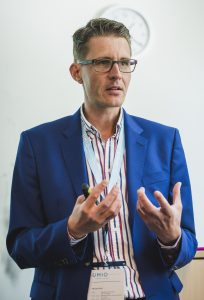Insights into financial decision-making: “People either calculate or guess when estimating an annuity pension benefit”
How do people make financial decisions? How can we gain insight into what’s going on inside their heads? And what can we do with that knowledge? These questions are central to a new study being carried out by Thomas Post of Maastricht University. “Our research showed that, roughly speaking, people take one of two approaches to estimating the value of an annuity (such as a pension benefit): they either calculate or they guess. Financial literacy and general numeracy are key factors in determining whether people do one or the other.”
“Take a situation where a person reaches retirement and has €500,000 to last them for the rest of their life. What would be the best way to distribute a sum like that? And what would you base that conclusion on? We presented these questions to a large sample. Respondents were completely free to come up with their own method and motivation. While this approach left us with the relatively complex task of analyzing a wide variety of open-ended answers, it did provide valuable insights into how financial decision-making works.”
Calculators and guessers
“As I said, our respondents were completely free to answer the questions as they saw fit. Even so, a very clear dichotomy emerged. About 40% began actively calculating. Their calculations were reasonably adequate and resembled the way actuaries calculate, albeit a greatly simplified version. The remaining 60% of respondents simply guessed. In this group, the choices varied widely. Their explanations tended to be sketchy, and they often underestimated the value of an annuity payment in comparison to a higher lump sum. People who were inclined to do the math scored higher on financial literacy and general numeracy (i.e. the general understanding of figures and relatively simple mathematical problems). This strong correlation, along with a series of other tests, allowed us to rule out socially desirable answers.”
Nudge in the right direction
“Our results gave us insights into the simple formula that many people use when faced with distributing wealth over their lifetime. This led to the idea of giving them a little nudge in the right direction by providing them with the right ingredients for this formula. The aim is to help people to make a more realistic estimate and increase the interest in annuities. When we provided the relevant information about actual life expectancy in a follow-up study, we saw a strong effect among the calculators. It nudged them towards making the best choice. So a small intervention of this kind this can have a significant result. For the guessers, any such effect was markedly weaker. On average, this group did show a slight shift in the right direction, but the differences between various members of the group remained large.”
Beyond the focus group
“In the Netherlands today, most pensioners automatically receive an annuity-based pension, but it is inevitable that this group will be given more choice in the future. It is therefore important to be aware of the differences between ‘calculators’ and ‘guessers’ and also of the differences within the latter group. In many cases, the participants in pension schemes are already involved in the development of new products, information, and choice architecture. My recommendation would be: start with the absolute basics, don’t assume knowledge… and definitely don’t assume that people know what you know! Ask simple, open-ended questions and look beyond the focus group: talk to as many people as possible.”
| About Thomas Post Since the start of his doctoral research in 2003, Thomas Post has focused on research into optimum financing of old age. He has been involved in Netspar since its foundation in 2005. In addition to academic advancement of the field, Thomas is working to achieve a direct link to real-world practices, cooperation with a range of other disciplines, and research that has an impact on society. His annuity valuation study is the first in a series of studies that will apply the same research methodology to large groups of people, looking at the ways in which they reach decisions about their wealth and assets. One highly topical example is the way in which homeowners assess the current and future value of their property: initial analyses show far greater diversity in this regard than general indicators suggest.For more information, take a look at Thomas Post’s profile page. |
 UMIO Symposium 14 september 2018. Jonathan Vos Photopgraphy |
Read the paper Eliciting Individuals’ Financial Decision-Making Approaches with Verbal Protocols by Thomas Post (Maastricht University) and Wändi Bruine de Bruin (Carnegie Mellon University).


